Betta fish are one of the most popular aquarium pets around the world. Their vibrant colors and striking personalities make them a favorite among fish enthusiasts.
But owning a betta isn’t just about enjoying their beauty; it also comes with the responsibility of ensuring they are well taken care of. A significant aspect of this care involves feeding your betta fish correctly. So, how often should you feed a betta fish? Let’s dive in.
Betta Fish Diet
Natural Diet in the Wild
In the wild, betta fish are carnivorous hunters, primarily feeding on insects and small invertebrates. Their natural diet consists of protein-rich foods that provide them with the necessary nutrients to thrive. Understanding this natural diet is crucial when deciding what to feed your betta in captivity.
Types of Food Suitable for Bettas
To mimic their natural diet, you should provide your betta with a variety of protein-rich foods. There are several options available, including commercial pellets, frozen foods, and even live prey. Selecting the right combination of these foods ensures your betta receives a balanced diet.
How Often Should You Feed a Betta Fish?
Recommended Feeding Frequency
Most betta fish owners recommend feeding their fish once or twice a day. A good rule of thumb is to feed your betta small portions that they can consume within 2-3 minutes. Feeding more than this can lead to overfeeding, which is a common issue among betta owners.
Adjusting Feeding Schedules Based on Age and Health
The age and health of your betta can also influence how often you should feed them. Younger bettas, or fry, may require more frequent feedings, while adult bettas generally do well with one or two meals per day. If your betta is recovering from an illness, you may need to adjust their feeding schedule accordingly.
Types of Betta Fish Food
Commercial Pellets and Flakes
Commercially available betta pellets and flakes are the most convenient and popular food options. These products are specifically formulated to meet the nutritional needs of bettas, containing the right balance of protein, fat, and other essential nutrients.
Frozen and Live Food
Frozen foods like bloodworms, brine shrimp, and daphnia are excellent options for adding variety to your betta’s diet. Live foods can also be given occasionally, offering a more natural feeding experience. However, live food should be sourced from reputable suppliers to avoid introducing parasites or diseases.
Homemade Food Options
Some betta owners prefer to make their own fish food using ingredients like shrimp, fish, and vegetables. While this can be a good option for providing a fresh and varied diet, it requires careful preparation to ensure all nutritional needs are met.
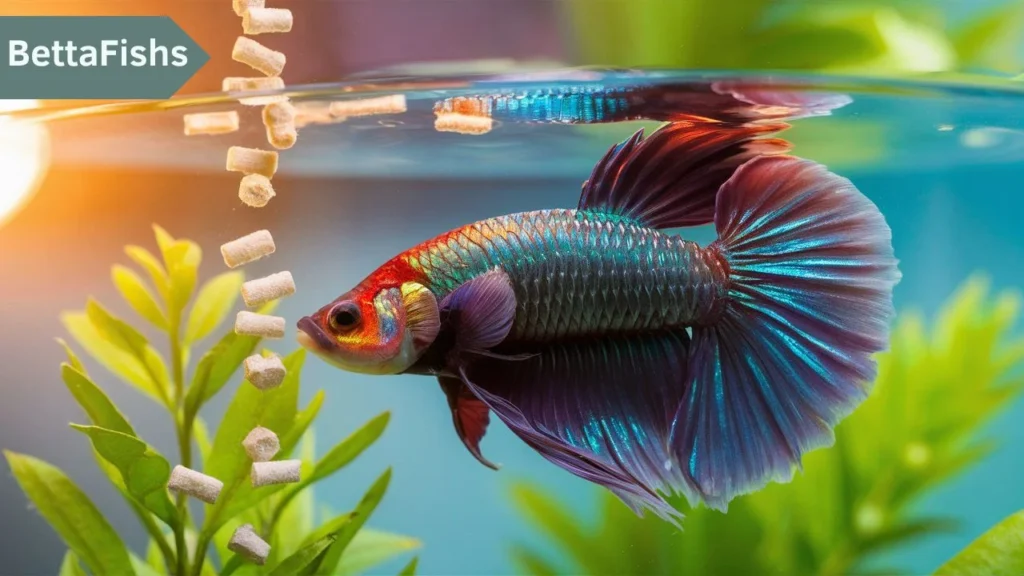
Portion Control: How Much to Feed Your Betta
Importance of Avoiding Overfeeding
Overfeeding is one of the most common mistakes betta owners make. Not only can it lead to obesity, but it can also cause digestive issues and pollute the tank water. Remember, bettas have small stomachs—roughly the size of their eye—so it doesn’t take much food to fill them up.
Tips for Measuring the Right Portion Size
A good guideline is to offer your betta an amount of food that they can finish in 2-3 minutes. If you’re feeding pellets, this usually means about 2-3 pellets per feeding. Generally, diet reduction is preferable to overfeeding.
Feeding Betta Fry
Special Considerations for Feeding Fry
Feeding betta fry requires more attention than feeding adult bettas. Fry have very small mouths and need tiny food particles that they can easily consume. They also require more frequent feedings due to their rapid growth.
Types of Food Suitable for Fry
Infusoria, baby brine shrimp, and specially formulated fry food are excellent choices for feeding betta fry. These foods are small enough for the fry to eat and provide the necessary nutrients for their development.
Signs You’re Overfeeding Your Betta
Common Signs of Overfeeding
Signs that you’re overfeeding your betta include uneaten food sinking to the bottom of the tank, a bloated appearance, and lethargy. Overfeeding can also lead to constipation, which is a common health issue in bettas.
Consequences of Overfeeding
Aside from digestive problems, overfeeding can cause the tank water to become polluted, leading to poor water quality and a higher risk of disease. It’s important to remove any uneaten food from the tank to prevent this.
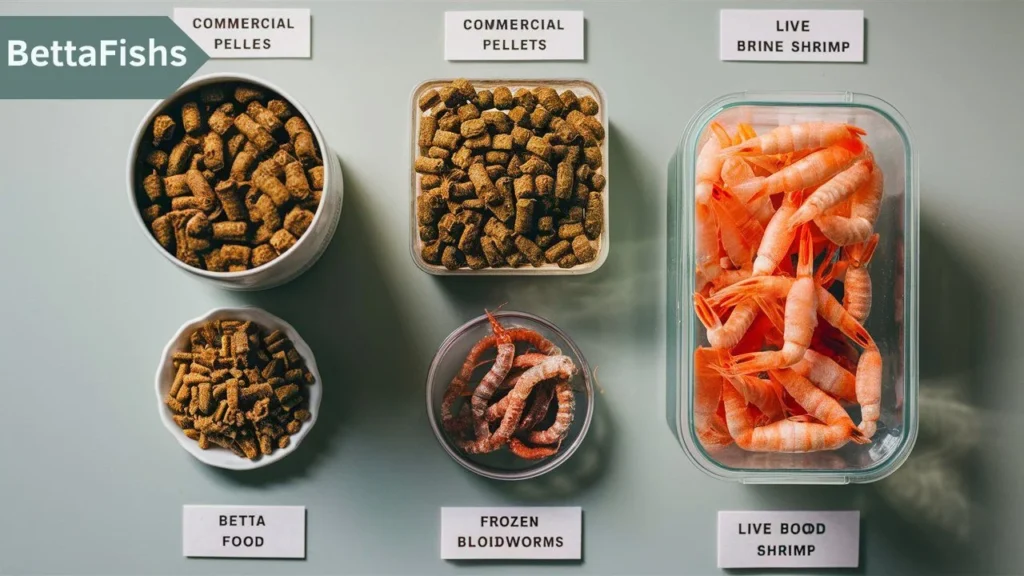
Signs You’re Underfeeding Your Betta
How to Tell if Your Betta Isn’t Getting Enough Food
If your betta appears thin, is losing color, or is showing signs of sluggishness, it might be underfed. Bettas that don’t get enough food may also become more aggressive or start nipping at their fins out of stress.
Health Issues Related to Underfeeding
Underfeeding can lead to malnutrition, weakening your betta’s immune system and making them more susceptible to illness. Ensuring your betta gets enough food is crucial for their overall health and well-being.
Best Practices for Feeding Your Betta Fish
Creating a Consistent Feeding Schedule
Consistency is key when it comes to feeding your betta fish. Try to feed them at the same times each day, as this helps establish a routine and reduces the likelihood of overfeeding or underfeeding.
Monitoring Your Betta’s Behavior and Health
Keep an eye on your betta’s behavior and physical appearance. A healthy betta should be active, have vibrant colors, and show a good appetite. Any changes in these areas could indicate a problem with their diet or health.
Frequent Feeding Problems and How to Prevent Them
Overfeeding
As mentioned earlier, overfeeding is a common issue that can lead to health problems and poor water quality. Stick to small portions and remove any uneaten food after feeding.
Feeding the Wrong Type of Food
Not all fish food is suitable for bettas. Make sure you’re providing food that is specifically designed for bettas or that mimics their natural diet. Avoid foods that are too large or difficult for them to digest.
Irregular Feeding Schedule
Feeding your betta at irregular intervals can cause stress and affect their health. Establish a regular feeding routine and stick to it as much as possible.
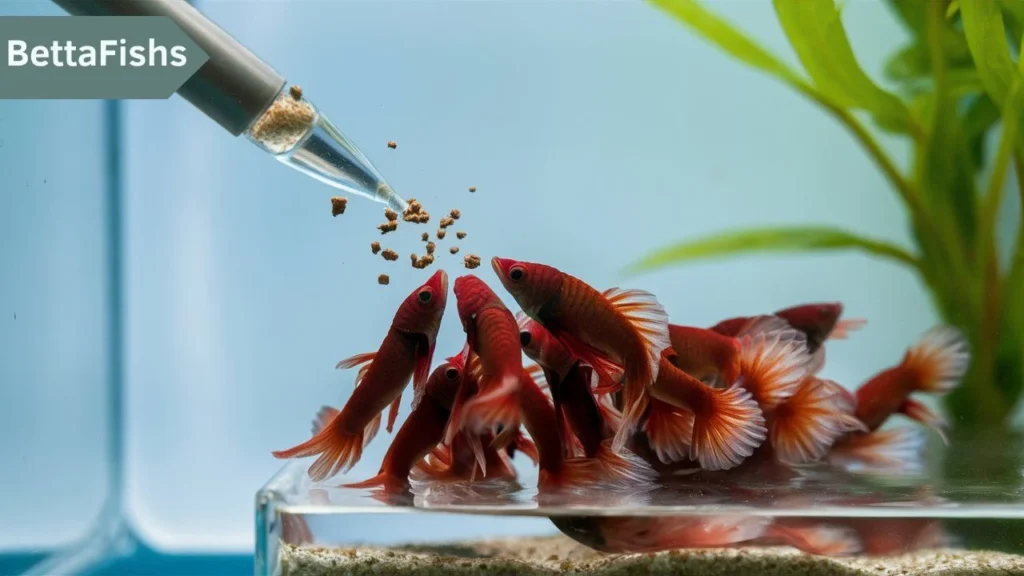
Feeding Betta Fish on Vacation
Options for Feeding When You’re Away
If you’re planning to be away for a few days, there are several options for feeding your betta. Automatic fish feeders can dispense food at regular intervals, ensuring your betta doesn’t go hungry.
Automatic Feeders and Other Solutions
In addition to automatic feeders, you can also ask a friend or neighbor to feed your betta while you’re away. Just be sure to leave clear instructions on how much and how often to feed them.
How to Store Betta Fish Food Properly
Best Practices for Storing Dry, Frozen, and Live Food
Proper storage of betta food is essential to keep it fresh and nutritious. Dry food should be stored in a cool, dry place, while frozen food should be kept in the freezer until ready to use. Live food should be used quickly or stored in a manner that keeps it alive and healthy.
Avoiding Food Spoilage
Spoiled food can harm your betta, so it’s important to check expiration dates and store food properly. When in doubt, it’s better to discard old food and replace it with fresh supplies.
Conclusion
Feeding your betta fish correctly is vital to their health and happiness. By understanding their dietary needs, establishing a consistent feeding schedule, and avoiding common mistakes, you can ensure your betta thrives in its environment. Remember, a well-fed betta is a happy betta!
FAQs
Can Betta Fish Go Without Food for a Day?
Yes, betta fish can go without food for a day or two without any adverse effects. In fact, some owners choose to fast their betta one day a week to help prevent overfeeding and digestive issues.
What Should I Do if My Betta Refuses to Eat?
If your betta refuses to eat, try offering a different type of food or adjusting the water temperature. Loss of appetite can be a sign of stress or illness, so monitor your betta closely for other symptoms.
Can I Feed My Betta Vegetables?
While bettas are primarily carnivorous, they can occasionally eat small amounts of vegetables like peas. However, vegetables should not make up a significant part of their diet and should be given sparingly.
How Can I Tell if My Betta Is Eating Enough?
A healthy betta should have a full, rounded belly after eating, but not be bloated. If your betta is active, has vibrant colors, and is maintaining a good weight, they’re likely eating enough.
Should I Fast My Betta Fish Once a Week?
Some betta owners choose to fast their fish once a week to prevent constipation and overfeeding. This is generally safe and can be beneficial for your betta’s digestive health.


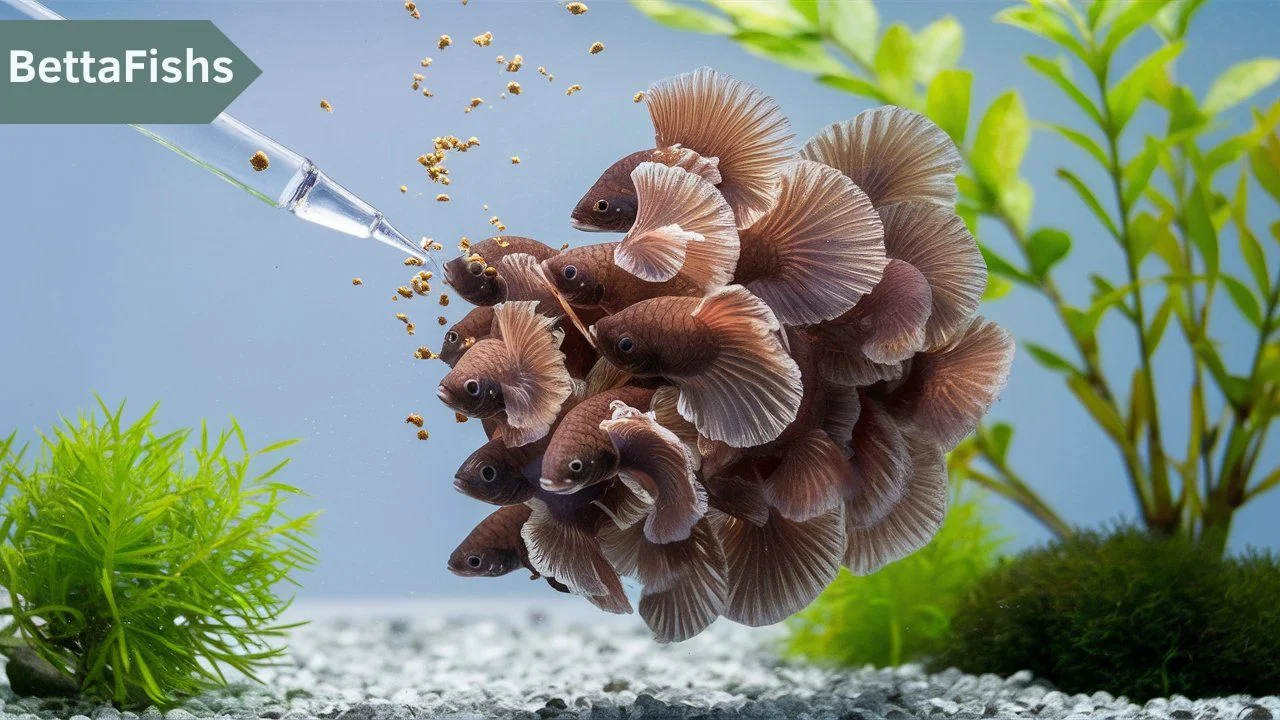
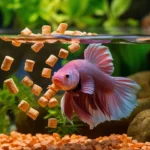
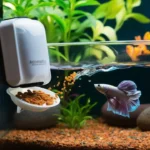
2 Comments
Leave a Reply2 Pings & Trackbacks
Pingback:How Often Should You Feed Betta Fish?
Pingback:how to feed betta fish while on vacation?